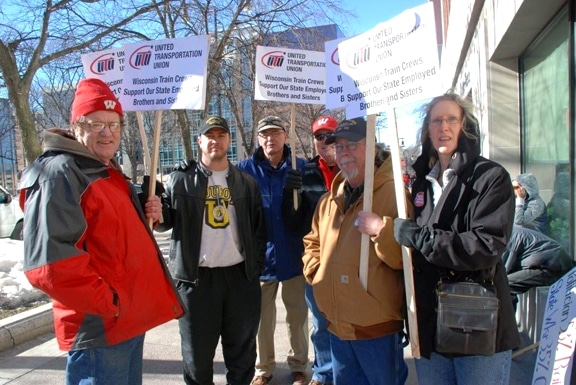Rallies in support of public-employee collective bargaining are being held in scores of cities across America to protest legislative efforts in Indiana, Ohio and Wisconsin to revoke that right.
A new attack on public-employee collective bargaining was launched Feb. 23 in Idaho, reports UTU Idaho State Legislative Director George Millward. Idaho Senate bill 1024 would prohibit state employees from joining unions and outlaw strikes. The UTU will participate in an AFL-CIO meeting this weekend to formulate opposition, Millward said.
UTU members wishing to participate in a rally supporting collective-bargaining rights for public employee should contact their state legislative director, as no formal schedule exists. Most rallies, in dozens of states, are being coordinated by state branches of the AFL-CIO.
Meanwhile, newspaper editorials and opinion articles are exposing legislative efforts to strip away collective bargaining rights as union-busting tactics with no legitimate connection to state financial problems.
Here is a sampling:
Nationally syndicated columnist Eugene Robinson:
“It has long been common for unions to accept better health and pension benefits in lieu of higher salaries — in effect, taking the money later rather than sooner. Now that these IOUs are coming due, Wisconsin wants to renege. I thought Republicans were supposed to believe that a contract is a contract, sacred and inviolate. Guess not. This is pure, unadulterated union busting.”
Stanford University law professor William B. Gould IV, a former chairman of the National Labor Relations Board:
“It is downright obscene to strip workers of unions while deficit-spending tax breaks to the rich are being handed out as they are in Wisconsin. As the United States has argued for South Africa, Poland and now Egypt, unions are a basic part of democratic society. Yet that is the principal under attack by Gov. Walker in Wisconsin now. The answer is not to destroy the democratic fabric and the political opposition, but rather to engage in dialogue.”
Linda Kaboolian, lecturer in public policy at Harvard:
“Gov. Walker isn’t interest in saving money. He’s interested in crippling the unions that didn’t support him last fall.”
New York Times editorial:
“Republican talk of balancing budgets is cover for the real purpose of gutting the political force of middle-class state workers, who are steady supporters of Democrats and pose a threat to a growing conservative agenda. Conservative leaders in most states with strong unions have in the past generally made accommodations with organized labor, often winning support on social issues in return. That changed this year after wealthy conservatives poured tens of millions of dollars into the election campaigns of hard-right candidates.”
Chicago Tribune columnist Clarence Page:
“Without the right to collective bargaining, a union is little more than a social club.”
Gallup poll survey:
“While the public has ambivalent feelings toward public sector unions, they say they oppose any move by their state to eliminate collective bargaining rights by about a 2-to-1 margin.”
Madison, Wisc.,Capital Times editorial:
“Gov. Walker has made too many budget decisions not with an eye toward fiscal responsibility but with an eye toward rewarding his political benefactors. Now the governor says that Wisconsin needs to end collective bargaining for public employees and teachers. This is simply absurd. This is not about the money. This is not a fiscal crisis. This is a political crisis. And Walker has the power to resolve it by refocusing on fiscal issues, as opposed to pursuing the political goal of breaking unions.”
Washington Post columnist Ezra Klein:
“Unions — through collective bargaining, strikes and other means — give workers power. They also make negotiations less lopsided … unions tend to see their constituents as not just their own members, but the ‘working class’ broadly defined. That’s why you’ll find labor’s fingerprints on everything from the two-day weekend to Medicare to the Civil Rights Act of 1965 — none of which require you to flash a union card before you can benefit from them.”
Denver Post columnist Mike Littwin:
“If you read the [Wisconsin] bill … the union busting is in pretty plain language. The union can only negotiate salary — but, it turns out, any raises above inflation must be approved by [voter] referendum. You try putting your next raise up for a vote and see how it works out. Under the bill, employers can’t collect dues. And it’s worse than that. Every year, under the bill, union members would have to vote to keep the union certified. You can figure this out. If the union can’t bargain, why would you keep voting to certify it — and also vote to keep paying your dues?
“This comes on the heels of last year’s Citizens United Supreme Court ruling, making it easier for corporations to contribute to political campaigns. If I understand the law, the ruling said, in effect, that corporations were people. And public-sector employees? The jury is still out.”
